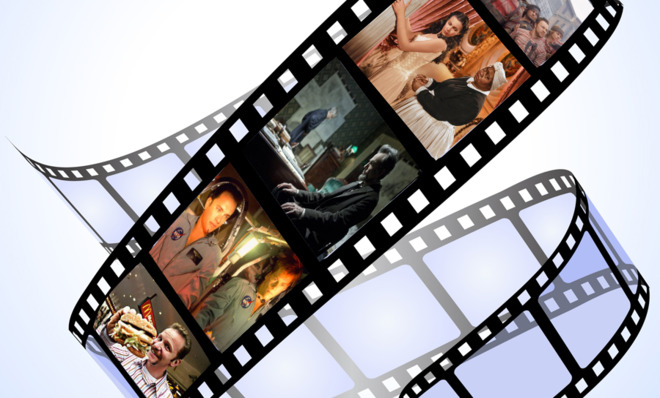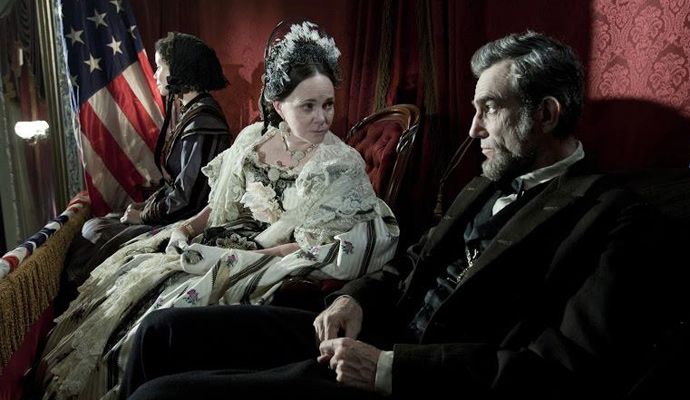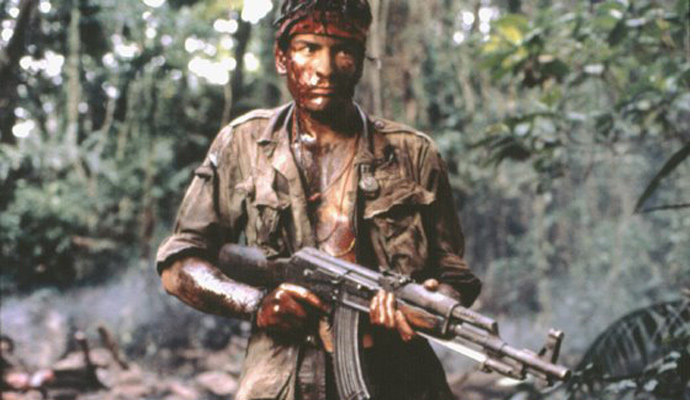Relive 238 years of American history with these 42 movies
Consider this American History 101

A free daily email with the biggest news stories of the day – and the best features from TheWeek.com
You are now subscribed
Your newsletter sign-up was successful
Begin with the beginning of our nation, and for that, the film adaptation of the musical 1776 (1972) tells the (slightly fictionalized) tale of the Second Continental Congress and the great debate over whether to declare independence. Though the film was largely panned, it managed to popularize the idea of John Adams as a crotchety, disliked, and obnoxious figure — a perception that also influenced Paul Giamatti in HBO's miniseries John Adams (2008), which spans from the Boston Massacre through the Revolutionary War to the 50th anniversary of the Declaration of Independence.
It's harder to find accurate cinematic depictions of the 1800s, which may be out of shame; certainly, the issues of Indian removal and the expansion of slavery are not America's finest moments. But when the Texas Revolution (1835-1836) and the Mexican-American War (1847-1848) did make their way to the silver screen, the face of the films was the beloved John Wayne, who directed and starred in The Alamo (1960) and appeared in the Academy Award-wining How the West Was Won (1962). These fictionalized accounts often crowd out strict historical fidelity by romanticizing the time period and destitute locations. Fortunately, westerns are the exception to the rule in this regard; there are endless examples of films that fictionalize plotlines but accurately portray historical grit. Reflecting further on the 19th century, Martin Scorsese's Gangs of New York (2002) does an outstanding job of capturing the city and Irish gang warfare, while HBO's TV movie Bury My Heart at Wounded Knee (2007) offers a sobering look at the atrocities and consequences of Indian removal.
Moving onto depictions of the Civil War, which stretched from 1861 to 1865, it's hard to overstate the impact that Gone With the Wind (1939) had on both the film industry and our popular culture. Still one of the highest-grossing films of all time, Gone With the Wind captured countless imaginations with its epic love story — but it's also the story of the dying South. Steven Spielberg's Lincoln (2012) offers much of the same, though the scope is considerably narrower — war and emancipation are understandably different when being viewed through a northern president's eyes. For a ground-level perspective, try Glory (1989), which focuses on the largely overlooked contributions of the 54th Massachusetts Volunteer Infantry, the first all-black regiment in the Union Army.
The Week
Escape your echo chamber. Get the facts behind the news, plus analysis from multiple perspectives.

Sign up for The Week's Free Newsletters
From our morning news briefing to a weekly Good News Newsletter, get the best of The Week delivered directly to your inbox.
From our morning news briefing to a weekly Good News Newsletter, get the best of The Week delivered directly to your inbox.

As the South was struggling to rebuild, the American Dream was slowly becoming reality for George M. Cohen. As told in Yankee Doodle Dandy (1942), Cohen was born into a vaudeville family and later went on to write over 300 original songs, including "You're A Grand Old Flag" and the WWI song "Over There." The overt patriotism of the musical serves to gloss over some of the more unpleasant events that occurred over its 60+ year time span. Fortunately, there are plenty of movies that tackle other important events of the era, including the 1899 newsboy strike of Newsies (1992) and the rise of gangsters in New York and Chicago, as in Bugsy (1991). Finally, there's The Color Purple (1985), which documents the problems faced by African American woman in the early 20th century through the (fictionalized) story of Celie Harris.
World War I can be understood through a pair of major movies: A Farewell to Arms (1932) and Wilson (1944). The former, released just three years after the publication of the Ernest Hemingway novel from which it derives its story, tells the story of an ambulance driver on the Italian front; the latter is a biopic of President Woodrow Wilson, beginning in 1909 and extending through the war.
After the Great War came great hardship, and Annie (1982), which is set during the Great Depression, shows the full range of income disparity, from the titular orphan to the billionaire Oliver Warbucks (and includes a visit to Franklin and Eleanor Roosevelt).
Fictionalized WWII epics like Pearl Harbor (2001) and Saving Private Ryan (1998) depict major events of the war. But the fullest picture of World War II from the American perspective is the miniseries Band of Brothers (2001), which tells the true story of the 101st Airborne Division's Easy Company.
A free daily email with the biggest news stories of the day – and the best features from TheWeek.com
Just five years after World War II, the United States would enter the Korean War; Robert Altman's M*A*S*H* (1970), later adapted into a hit TV show of the same name, offers a blackly comic take through the eyes of a medical unit in the midst of the Korean War (though it doubles, implicitly, as an antiwar movie pegged to the Vietnam War).
The 1940s and 1950s were also marked by rising minority contributions within American culture, along with accompanying conflicts. Cadillac Records (2008) chronicles the history of Chess Records — original home of Etta James, Chuck Berry, and Muddy Waters — and provides what Roger Ebert called "a fascinating record of the evolution of a black musical style, and the tangled motives of the white men who had an instinct for it." Taking place at the same time, West Side Story (1961) brings attention to the growing Chicano turf wars in New York.
Through it all, the Civil Rights movement pushed forward. The Butler (2013), which spans multiple presidencies, doubles as an exploration of the Civil Rights movement through the protagonist's protesting son. And Spike Lee's Malcolm X (1992) chronicles the life of the legendary civil rights leader with an unforgettable lead performance by Denzel Washington.
The assassination of John F. Kennedy loomed large over most of the 1960s, and Oliver Stone's controversial J.F.K. (1991) explores the full ramifications of his death (even if its fidelity to the historical record is questionable at best). In 1968, his brother Robert Kennedy was also assassinated — a similarly traumatic event that was thoroughly explored in Bobby (2006).
The 1970s were full of events that would later lend themselves to cinematic retellings — the Apollo 13 mission in Apollo 13 (1995), the election and murder of Harvey Milk in Milk (2008), and the entire Nixon presidency in Nixon (1995), to name but three. There was also the Vietnam War, which sparked a far-reaching debate that divided American culture in the 1970s — a controversy that has since been chronicled in numerous films that are generally critical of the war, including Hair (1979), Platoon (1986), and Across the Universe (2007).

The 1980s were a fractured time in American culture, but there are several films that have gone on to capture key events from the decade. The Best Picture-winning Argo (2012) documents the Iranian hostage crisis that began in 1979 and dipped into the early 80s. Paris Is Burning (1990) documents the underground ball culture of the mid-to-late 1980s, becoming one of the first documentaries to act as a catalyst for social change. And the TV movie The Challenger Disaster (2013) documents the tragic Challenger space shuttle disaster of 1986, and the subsequent attempts to root out its cause.
The 1990s are still too recent for most filmmakers to take a nostalgic or critical look back at their biggest events — but documentaries can fill in some of the gaps. The War Room (1993) offers a real-time look at the (ultimately successful) presidential campaign of Bill Clinton. Meanwhile, as gay rights became an issue on the national stage, The Laramie Project (2002) offers a heartbreaking look at the life of Matthew Shepard, a gay man who was murdered in 1998.
Then there's Michael Moore's exploration of gun violence in Bowling for Columbine (2001) and Morgan Spurlock's takedown of the fast food industry in Super Size Me (2004). The scathing Fahrenheit 9/11 (2004) pummels the Bush presidency in the wake of the September 11 terrorist attacks. And political documentaries like Mitt (2014) and The Case Against 8 (2014) explore the full range of contemporary American culture.
It would do us well to pay attention to such connections and narratives, and to realize that entertaining storytelling can also be a reflective experience. The movies mentioned here are a strong starting point for anyone who wants a unique course in American history, but a deeper dive into American cinema will paint a larger, stranger, and more inclusive picture — one that speaks to national interests, collective ideals, factual history, and the space that occupies the in-between.
Stephanie is a freelance writer and communication strategist based in New York. Her work focuses on pop culture and the relationship between entertainment and society.
-
 ‘Restaurateurs have become millionaires’
‘Restaurateurs have become millionaires’Instant Opinion Opinion, comment and editorials of the day
-
 Earth is rapidly approaching a ‘hothouse’ trajectory of warming
Earth is rapidly approaching a ‘hothouse’ trajectory of warmingThe explainer It may become impossible to fix
-
 Health insurance: Premiums soar as ACA subsidies end
Health insurance: Premiums soar as ACA subsidies endFeature 1.4 million people have dropped coverage